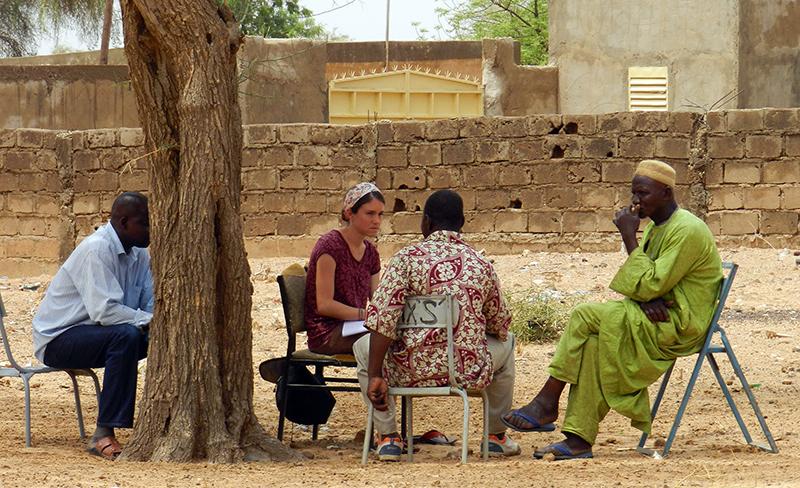
Droughts. Wildfires. Floods.
Due to changes in climate, these extreme weather events are becoming increasingly frequent and intense. And they come at a price: climate and weather disasters cost the American economy more than $100 billion in 2012 alone.
The National Socio-Environmental Synthesis Center (SESYNC) recently partnered with the U.S. Geological Survey (USGS) and the U.S. Department of Agriculture (USDA) to catalyze actionable, data-intensive research at the water and food systems nexus using the federal government’s extensive, freely available climate-relevant data.
It’s an undertaking that takes a village of federal agencies and private sector collaborators. Leading the charge at SESYNC is Dr. Kristal Jones, a newly hired research fellow coordinating the “Data to Motivate Synthesis” Program for early career scientists.
We invite the extended SESYNC community to welcome Kristal to Annapolis!
First, get to know our new research fellow a little better. Kristal answers a few questions below about her work … and a few questions just for fun.
Name: Kristal Jones
PhD: Rural Sociology and International Agriculture and Development, Pennsylvania State University
Hometown: Bozeman, Montana
What is your field of study?
Agricultural social science.
Why are the fields of rural sociology and agricultural social science important?
Social scientists within colleges of agriculture provide a lot of theoretical and qualitative research expertise. Particularly in the agricultural research, extension, and teaching model, I think that social scientists are vital to maintaining the connections between scholarly research and the people who actually put that research to use.
I also think that the emphasis rural sociology places on agricultural production and food consumption as one system is increasingly relevant. People are starting to link questions of production–consumption to climate change and to energy use. Even if departmental titles change, “rural sociology” grows in salience because its body of knowledge is drawn upon so consistently when talking about interconnected food systems.
Could you briefly describe your doctoral research?
I’m interested in the social dynamics of agricultural production systems and decisions. My doctoral research looked at the social implications of agricultural research—specifically, plant breeding to develop new varieties of seeds—in the context of West Africa. For example, why do farmers choose to use or not to use the new seeds? If they are using the new seeds, what are they doing with them over the course of a couple of years? Are farmers saving them each year; are they sharing them with each other? What is the social meanings of those decisions? In other words, is saving seeds a buffer against unexpected climatic events, and is sharing seeds is a sign of respect?
Did you learn anything that surprised you?
I think it’s important to say this when I talk about my dissertation: I initially approached this research with my own bias against market-oriented systems, which are especially dominant in international agricultural development. I also assumed that poor or smallholder farmers wouldn’t like the market-oriented system, or that it just wouldn’t work for them. But the research shows that farmers engage with a whole range of systems—market-oriented, informal, non-formal—for different reasons at different times. So it was good for me to have my preconceived notions challenged.
Could you briefly describe your role at SESYNC?
The Data to Motivate Synthesis (DTMS) Program at SESYNC is situated within the Obama Administration’s Climate Data Initiative. The initiative includes an incredible amount of data, so one of my most immediate priorities is to identify which of these data will best help us answer the questions we have about water–food systems. This includes developing a conceptual framework for the DTMS Program and identifying key research questions. I’m also currently reaching out to and identifying external advisors to help us with those tasks.
The ultimate goal of the project is to host and facilitate workshops for data discovery—it will be my job to circulate information about these workshops, help select workshop participants, and generally coordinate all logistical details.
Why is the water–food systems research that the DTMS Program is undertaking important?
The most obvious answer is that many places throughout the U.S. are experiencing less overall rainfall as a result of climate change—and water scarcity seems to be intensifying. I think we all recognize that water is foundational to agriculture. And people are increasingly making connections among agricultural production, natural resource consumption, and the health and stability of ecosystems.
This kind of systems approach requires the integration of multiple data sets and multiple types of expertise. If we’re going to understand the interaction between, for example, irrigation and soil fertility and yield over time, we need to involve a lot of different disciplines. It’s also why being a part of the Climate Data Initiative is so valuable, because we have access to so many different types of data and experts within partnering agencies.
And now for your James Lipton moment: What’s your favorite science word?
I think that “epistemology” might be my favorite science word.
What’s your least favorite science word?
“Randomized.”
What profession other than your own would you like to attempt?
Social worker. I spent the last two years learning a lot about access to health services as health insurance is changing in the U.S., and I have a lot of respect for professions that help individual navigate these complex systems. I guess it’s sort of science-in-action—the flip side of actionable science—taking in a huge amount of information and personalizing it to make someone’s life a little better.
The National Socio-Environmental Synthesis Center, funded through an award to the University of Maryland from the National Science Foundation, is a research center dedicated to accelerating scientific discovery at the interface of human and ecological systems. Visit us at www.sesync.org and follow us on Twitter @SESYNC.
Top photo courtesy Dr. C. Tom Hash, International Crops Research Institute for the Semi-Arid Tropics (ICRISAT).